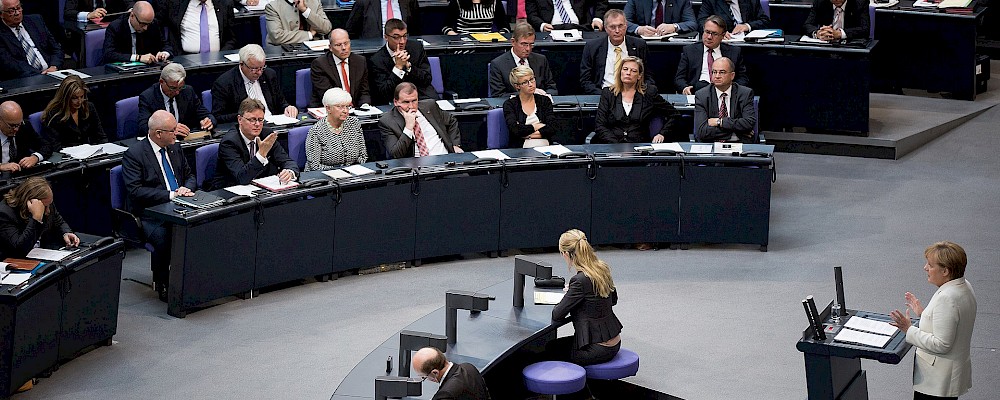Eva Illouz: Capitalist Subjectivity and the Internet
The Alexander von Humboldt Institute for Internet and Society (HIIG) and the Federal Agency for Civic Education (bpb) are jointly organising a series of scientific lectures on the topic "Making sense of the digital society". The rapid pace of technological change leads to enormous uncertainties. On 6 March 2019, Eva Illouz spoke at the HAU (Hebbel am Ufer) about “Capitalist subjectivity and the Internet”.

Emotions and the Internet?
The Internet was created as an open, decentralized and transparent project. Obviously, more and more monopolistic, opaque or centralized structures are emerging today. But what happened to the open/cooperating spirit? Illouz explains this by the logic of capitalism or, more precisely, surveillance capitalism. She pointed out that today's capitalism uses emotions for its purposes. Emotions are crucial to the construction of social life, but are nowadays also subject to materialistic or capitalist circumstances. The logic of marketing changes the way objects and subjects are perceived. This form of capitalized subjectivity can be perfectly integrated into the Internet. The Internet can become a market of subjectivity.
Emotions play a decisive role in the design of the Internet (e.g. Emoijs are standardized emotions). The use of emotions has been raised to a new level (e.g. dating apps etc.). In addition, the like-dislike logic of the Internet leads to market-like circumstances regarding emotions. Emotions are consumed as commodities. Illouz calls this phenomenon "emodities", which signifies consumer goods that have the shape of emotions. One example for these emotionalized commodities is a “meditation”- app. The use of such apps has increased rapidly in recent times.
Tinder
After these more general views on emotions and the Internet, Illouz switched to her main example, the dating app "Tinder". Tinder has become a cultural phenomenon since 2014. The main function of it is that you can swipe to the left or right, depending on whether you like the picture of some person in question or not. If two persons like each other, it is called a match. It seems as if the free market is coming to sex.
Illouz's main thesis about Tinder is that this app disrupts earlier forms of sociality. What does that mean? First of all, there is the effect of visualizing self-good. Of course, every interaction is visual, but in Tinder's case it is based on self-directed photography. This changes self-perception and the perception of others. Illouz argued that this "spectacularization of the self" creates great pressure for young people. Another aspect in this context is that the new ideal of beauty is no longer tied to one class. Visibility became purchasable. The upgrading of one's own appearance is understood as self-investment in the field of money or sex. Furthermore, the user must decide on Tinder in the shortest possible time whether he likes the other person. This spontaneous evaluation leads to a trend of conformity in the assessment of beauty. In contrast to normal sociality, interaction on Tinder can be one-sided. All these mechanisms (and Illouz named many more) are institutionalized in the technology. The speed and abundance of partners follows the classical capitalist logic, which wants to produce ever faster and values efficiency highly. Romance becomes secondary.
In addition to these aspects, Tinder can also be understood as a network of interaction. The most important characteristic is that this interaction replaces solidarity. Networks are characterised by the fact that they are not about narrative but about informal interaction (not stories, but information). Classical forms of love are also melted. Tinder often serves only as ego booster, the pleasure is fabricated by the technology itself.
Discussion
In the discussion that followed, it was asked whether the phenomena described were only signs of a general trend. Illouz pointed out that all these new technologies have taken the quantified self to a new level. As much as Illouz's considerations could claim a certain plausibility for themselves and I would agree with her in most arguments, some questions remained open in the end. What serves as a comparison when she speaks of the social being disrupted? Is there a kind of ‘good nativeness’ in the background? Moreover, a more classical concept of love seems to have served as a normative basis. Some of her considerations seem to be based almost on a kind of technical criticism that doesn't quite convince me. Thus, the works of Donna Haraway or Bruno Latour and their theorization of non-human actors show that a reasonable inclusion of technology can certainly hold critical potential.
More articles by this author

Ein Strohmann geht um in Europa: Pauschalkritik an postkolonialem Denken als Tragödie und Farce
Niko Gäbs Polemik „Critical Highness“ weist darauf hin, dass es im postkolonialen Diskurs Leerstellen in Bezug auf Antisemitismus gibt. Dies zeigt nicht zuletzt die Debatte um den postkolonialen Theoretiker Achille Mbembe (Cheema/Mendel 2020). Auch Edward Said, Koryphäe der postkolonialen Theorie, steht im Verdacht „die Grundlagen eines sich postkolonial gerierenden Antisemitismus“ (Salzborn 2018, 124) zu formulieren. Nichtsdestotrotz liegen Gäbs Text einige Missverständnisse zugrunde, die wir im Rückgriff auf postkoloniale Theorien und neuere theoretische Entwicklungen erhellen wollen.

(Philosophische) Diskussion um Corona: Timeline Februar-April
In diesem Beitrag tragen wir eine Auswahl der zahlreichen Beiträge der philosophischen und soziologischen Diskussion zu und um das Coronavirus zusammen und liefern teilweise eine kurze Zusammenfassung der Beiträge. Wir vollziehen dabei den Gang der Kontroverse vor allem (aber nicht nur) anhand der Debatte nach, die sich ausgehend von dem Beitrag “The Invention of an Epidemic” des italienischen Philosophen Giorgio Agamben entwickelt hat.

F(EU)TURE FESTIVAL
The F(EU)TURE FESTIVAL took place from 1 to 16 of March 2019. Together with CLB Berlin, the European Democracy Lab turned Moritzplatz into a place breathing the European spirit as it is aptly called on the festival’s website. Together with activists, researchers, artists, intellectuals and a large number of visitors from all sectors of society, the state and future of European democracy were discussed. Our authors were on the spot and will go into some of the events below.
More articles in this category

Ist das Licht wirklich erloschen?
In ihrer politischen Analyse „Das Licht, das erlosch. Eine Abrechnung“ thematisieren die Autoren Ivan Krastev, bulgarischer Politologe, und Stephen Holmes, US-amerikanischer Professor für Rechtswissenschaften, den Aufschwung des demokratischen Liberalismus, der unmittelbar nach dem Zusammenbruch der Sowjetunion und dem Untergang der kommunistischen Ideologie Ende der 1980er Jahre in Ost- und Mitteleuropa Einzug hielt. Drei Jahrzehnte nach der politischen Wende folgte auf anfängliche Euphorie die Ernüchterung: Dort wo einst Überzeugung und Begeisterung für das westeuropäische demokratische Modell herrschte, kehrten Enttäuschung, Populismus und antiliberalen Revolte ein.

Bruno Latours Ausrufung des Kriegszustandes. Geopolitik, Klimabewegung, Utopie und der Kampf um Gaia - ein Kommentar.
"Facing Gaia" (dt. „Kampf um Gaia“) geht auf die "Gifford-Lectures" zurück, die der französische Soziologe Bruno Latour 2013 an der University of Edinburgh hielt. Darin plädiert er dafür, anzuerkennen, dass wir unter einem neuen Klimaregime leben, welches es notwendig mache, erneut geopolitisch zu denken.

Krisenhafte Demokratisierung: Philip Manows zweite politische Analyse erklärt die „(Ent-) demokratisierung der Demokratie“
Vor zwei Jahre erschien Philip Manows originelle Analyse des (nach wie vor aktuellen) Populismusphänomens. Mit seinem neuen Buch „(Ent-)demokratisierung der Demokratie“ ist ihm wiedermal eine differenzierte Deutung der politischen Gegenwart gelungen, die gewohnte Perspektiven verkehrt und sich von überkommenen Hypothesen abwendet.